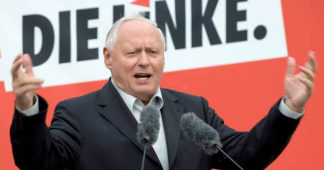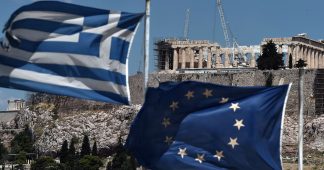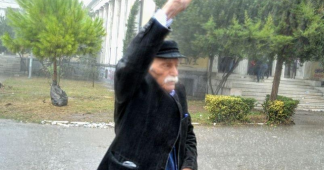By Dimitris Konstantakopoulos
Second of two articles. You can read the first at https://www.defenddemocracy.press/2005-22
The 2010s were initially sealed by a high demand of radical leftist alternatives. We had World Social Forums, Occupy Wall Street in the USA, “Indignant”, SYRIZA and Podemos in Greece and Spain, Corbyn in Britain, Melenchon in France, the rise of Linke in Germany, Sanders in the USA, the almost revolutionary mobilisation of the Yellow Vests in France. The two central demands of the Yellow Vests were the democratic control of the political power (by referenda and the possibillity of revoking elected officials) and the protection of the living standards of the poorest strata of society.
But, all these efforts were defeated for various reasons we cannot analyse in detail in the context of this article. We limit ourselves to point out that one of the main reasons behind the failures was the unwillingness of those forces to go to a rupture with the dominant forces of Western capitalism when the situation asked for such a rupture. Another one was the distance the “radical leftist” organisations took gradually from the aspirations of the more plebeian, popular strata of Western societies, their adaptation to the mentality of petty bourgeois strata which tend to dominate more and more, if not monopolize, the cadres running leftist organisations.
The “battle of Greece” and its significance
The most significant and the most humiliating defeat of all was Syriza’s capitulation in Greece, given the central role of the Greek crisis in the evolution of the whole of Europe and of the huge interest in the world for the experiment of a force claiming to be radical leftist coming to the power of a EU and NATO country. Syriza came to power because its leaders had promised to struggle against the neocolonial regime the Troika of the Creditors imposed on Greece. But they did nothing to prepare themselves and the Greek people for such a struggle. Instead, they turned to the USA and Israel, hoping those two forces would help them acquire a “presentable” compromise with the creditors. They got in return an enormous humiliation for which the vice-President of their government, Yannis Dragasakis, went as far as to thank in public the US administration!
By supporting the capitulation of Syriza, the main forces of the European “radical left”, Linke in Germany, Podemos in Spain and the PCF in France proved to their supporters and potential supporters that they were no much better than the usual European Social Democracy, thus undermining their own raison d’ etre.
Many cadres of the so called “radical left” in the West were enthusiastic about the rapid rise of Syriza in Greece. They did not understand that the rise was the reflection of the depth of the crisis. In a country were people were throwing themselves from the roofs of their homes, preferring to die than to suffer the consequences of the crisis and of the “bail out” program was imposed on them, it was quite natural that voters would turn their back to the traditional parties, in their search for somebody willing to struggle.
The second thing the cadres of the European Left did not realize was that their adversary was decided to go to the end. They were prepared for some sort of “easy reformism”, not for more serious clashes. They signed a nearly revolutionary manifesto (https://www.defenddemocracy.press/common-appeal-for-the-rescue-of-the-peoples-of-europe/), back in 2011, but they did nothing to apply it.
Sanders and Corbyn
But the left-wing dynamic inaugurated in the beginning of the decade continued to fuel radical currents even after the Syriza defeat of 2005, in particular Sanders in the US and Corbyn in the UK.
But the same problems appeared also there, even in milder form, plus the weight of the fact both Sanders and Corbyn were acting in the context of relatively strong capitalist and imperialist countries. Sanders remained after all obedient to the discipline of the Democratic Party and he supported Hillary Clinton for President in 2016. He is also following the main western narrative that Putin is an autocrat and we must fight against Russia in the sake of “democracy”. This is of course an absolutely false ardument. All western interventions, from the former USSR during Yeltsin’s time to Libya and Iraq were never aimed at some kind of democracy (that is, according to the etymology of this word of Greek origine, which means the power – kratos – of the people – dimos the assembly of citizens). And they did not bring any kind of democracy. The Clinton administration went as far as to suggest and support the bombing of the Russian parliament in 1993, not in order to impose any democracy (power of the people), but in order to impose a cleptocracy of friendly to Washington oligarchs. By accepting all this nonsense which became the main narrative of the western ideology since 1990, many currents of the “Left” found a way to express finally their solidarity with the western imperialism and undermined their own struggle.
As for Corbyn, although he must be credited with one of the most advanced and serious programs the European left has elaborated and with a great honesty, he made two ctitical mistakes. First, he put in doubt the Brexit vote, which had become the symbol of the struggle for sovereignty in particular for the British working class. Second, when he was attacked as an antisemite by an extremely powerful Zionist lobby and all the British establishment, he did not counteratack, accusing them of wanting to neutralize him because he was an obstacle to their wars, which was the truth. He adopted a defensive posture trying to prove he is not an antisemite, which he has never been, as no democrat or humanist can be.
Melenchon and the French Left
Melenchon’s policies were much better, which is why he is now dominating the French left. But he also failed to work systematically for the creation of a mass and deeply democratic party and of a mass and deeply democratic popular movement, with the mass organization leftist parties had in the past but with a different, democratic mentality and organizational structure. This is indispensable if you want to be able to achieve something upon coming to power. Macron as a President can have the support of the Capital and of the state machine. Le Pen would have the support of the far right sections inside the Army, the Police and the secret services and also the support of a part of the Capital. Without a massive force able to mobilize itself, an authentic leftist would be easily pushed to defeat or capitulation. (Another precondition of success is to dispose of strong international alliances. In Europe, a federation of radical leftist forces is also indispensable).
After all, even the most radical politicians of the European Radical Left, and Melenchon is one of them, are also the product of an era of relative prosperity and stability which followed the War in Europe. They are not prepared for some kind of “revolution”. When France approached a situation of near “power vacuum”, in the beginning of the Yellow Vests revolt, Melenchon did not ask for the resignation of the President.
By the way there is a very strange thing happening in France. The majority of its leftist political elite has grown politically inside various Trotskyite organisations (although some of them were more stalinist in their mentality than many stalinists). Yet they don’t seem to appreciate much two of the more fundamental points in Trotsky’s policies, like his insistence on the “united front” and the respect of the right of tendencies inside the “avantguarde”, the “revolutionary party” itself, in order to preserve its democratic character, which is necessary to a political organisation for many reasons, among them in order to be able to analyze the very composite problems a modern society is adressing to those who want to reform it and for a popular front to be able to combine different layers of the popular social strata with different levels of social and political consciousness.
If the French Left was united it would have defeated Le Pen during the recent first round of the presidential election. But no one has tried seriously to realize such a unity.
The same result could be achieved if the French Left had developed a serious popular dynamic, including in the rural and peripheral areas, operating on the social micro-level and not only at the central political stage. In the past, Communist militants were going from door to door to persuade people and they were present in all social strata.
Many present-day leftists pretend to be radical, but, in reality, they are rather conservative. They are better adapted to the situation of relative stability of the recent decades, not to the necessities of the new era which bears in itself the probability of cataclysmic events (like the sui generis world war has just begun and, to an extent, the COVID crisis which preceded it).
The revolt of the Yellow Vests represented one of the most interesting social and political experiences of the last decades in the West, and this is the reason it was so much underestimated, unreported and misreported by western media (even supposedly progressive ones). They were terrified at the prospect of the Yellow Vests finding any imitators in other western countries.
The Yellow Vests came in the conditions created by the capitulation of SYRIZA and the betrayal of the mandate it received from the Greek people during the 2015 referendum. This betrayal came to remind to French leftist militants who had participated in the past in various organisations, of the historic betrayals of the parties of the French Left, like in 1968 and 1983, thus contributing in creating an atmosphere of complete rejection of political organisations and protecting its unitary character from intrusions of political organisations or from adopting a divisive adherence to the left. The Yellow Vests were the only revolt movement in modern French history under yellow and not under red symbols.
But all that led to a spontaneist, almost anarchic character of the movement which made it unable to safeguard its continuity in conditions of retreat of mibilisation and also unable to produce or facilitate the production of a political outcome. Once again it was proved that it is indispensable for that to have a nucleus of very serious, well-educated and dedicated people, to be able to lead such movements, of course under the permanent, continuous control of the people, in conditions of authentic, real democracy. Unfortunately, the social conditions that prevailed in Western Europe for many decades and the decline of all leftist forces and of the socialist ideology itself did not permit the emergence of such people.
The movement faded away when COVID came, but it has had a profound impact on French society and an influence which will be felt certainly in the future. If Macron loses power in the second round, he will lose it because of the Yellow Vests, but it is not probable that the later will be happy with the result. (As we write those lines the most probable result of the second round seems to be by Macron’s election, but there is also a definite possibility of Le Pen wining).
We do not want to diminish the importance of all those efforts undertaken in the last 20 years, because without them we would have been in a much worse situation. And, also, because the experience acquired through them may prove valuable (if correctly analysed and assimilated, which has not been done for the time being) for any future attempt aiming at a profound change of western and global civilisation, without which humanity is doomed – in the medium term – to fade away in extremely painful ways.
But those defeats did not and could not stop the quest for radical solutions, because this quest is the direct result of the continuing crisis. This is why they opened the way and created the ground for the emergence of the Far Right as a force expressing the popular desire for a systemic change. Just three hours after the signing by the SYRIZA leader of the Third Memorandum with the Creditors, Marine Le Pen stated: “Tsipras betrayed”. The message was: “The Left is betraying you, trust me, trust the the Right”. One year later Mr. Trump was elected President of the United States. (One of the reasons Melanchon did better than the Linke or Podemos, is because he promised to the French “never to become Tsipras”).
The far Right counteratacks
After the fading away of the Yellow Vests movement, in the conditions of the pandemic, but also because of the impasse of this movement, we have witnessed a counter – attact of the ideologues of different versions of the Far Right. The whole atmosphere has shifted en masse to them, as the crisis of the system, in particular of the 5th Republic and of globalisation, has continued unabated. Eric Zemmour has been the avantgarde in relegitimising those ideas, being somehow the equivalent of Bolshevics compared to the “Mensheviks” of Le Pen. Zemmour has had the support of a big French media oligarch, Balore, and he adressed himself more to a bourgeois clientele, unlike Mrs. Le Pen whose base is more in the popular strata.
Both currents, they claim it openly or not, are the ideological and political heirs of the fascist Action Francaise of the intra-war period, of the regime of Marshal Petain which cooperated with Nazis during the War and of OAS, the Far Right group which attempted a coup against De Gaulle, for Algeria to remain French. Such currents were marginal after 1945. Their reappearance and their quest for hegemony represents a radical shift in the history of the 5th French Republic, it betrays the decadence of Europe and of France in particular, and can prove to be a milestone in the evolution of the Western political regime established after WWII.
History often proceeds like Nature. Reaction brings counter – reaction and counter – reaction also. The rise of the Far Right ideas during the last two years has probably motivated a number of leftists voters, dissapointed by Leftist parties and electoral politics, to move and vote finally for Melenchon, providing him, after all, with a considerable political force. If Macron will be elected again (which seems now the most probable scenario), it will be not because of his qualities, but because of Marine Le Pen’s qualities. And it will be most probably the last time. His “centrist” base has rapidly eroded, as two “radical” political forces have appeared to his Left and to his Right. France is divided in three parts and it will be more and more difficult to govern it, something that will become even more clear during next June’s legislative elections.
Repetition of the interwar dynamics
Mutatis mutandis, we witness now the reappearance of the same phenomena which characterised the 14 years of the Weimar Republic (1919-33), that is the continuous oscillation between the Left and the Far Right which ended with Hitler, the more decisive, conquering power. But we are rather at the beginnong or towards the middle, not to the end of such a circle.
Of course, social and political phenomena are not repeated in all their external characteristics, and our era is different from the intrawar period in many critical aspects. Trump or Le Pen cannot be mechanically compared to Hitler or to Mussolini, although they represent a kind of “proto-fascist” phenomena. By the way Hitler himself was not the same in 1919 and in 1933.
We understand that many readers will categorically oppose such comparisons (*). It is true that nowadays radical and Far Right forces have a lot of differences with such movements of the intra-war period. Still, the historical function they come to play is essentially the same. That is to use the popular revolt against the politics of Capital in order to stabilise its domination by changing its political and ideological basis and by diminishing drastically democratic rights. As Wilhelm Reich put it, “the Germans wanted to make a revolution, but they were afriad of doing it, so they assigned this work to the Nazis”. By imposing an authortarian political regime they reduce the possiblllities of the popular strata to struggle for their interests.
What the radical right wants to do is trying to replace the ideology and the system of “happy globalisation” (“la mondialisation heureuse”) with a sort of real or pseudo-nationalism, as the new ideological foundation of capitalist domination. They may pretend to be pro-peace or even pro-Russia, but this is a fraude. In reality, by changing the ideological foundation of western societies, from the neoliberal globalisation to nationalism and the fight of all against all, they will facilitate in the long run the multiple wars which tend to become the new “normal” of the world (western) capitalist system (war against Russia, China and the South, war against the social and political achievements of western popular classes, war against Nature, including human nature, war against Civilization). It is rather unimportant if they said one or two friendly words to Putin, which hardly help the Russian cause in western public opinion. Hitler has made much more friendly gestures towards Russia. The decisive factor is not what politicians say. It is the internal social and geopolitical logic of their project. The social and geopolitical logic of the Far Right project is leading to war.
What we need is a completely differend organisation of societies and of the world, based on cooperation, not on the quest for domination.
A comment on nationalism
In the United States, Trump’s nationalism is a real imperial nationalism. Its function is to gather Americans behind the drive to keep the dominant position in the world they have held for a century. Biden, by acting in the same way, probably believes that he will win next elections, but, in reality, he is running the risk of helping the opposite tendency.
But in France, we are in right to speak of pseudo-nationalism, because the problem of the French nation is hardly the danger of being dominated by its citizens of African or Arab origin, or refugees and immigrants, but rather by foreign powers like the US and Israel and the power of big, international finance, all of which have already acquired a tremendous influence on the French economy, politics and media. Neither Mme Le Pen nor Eric Zemmour have anything to say about it!
A second reason we speak of pseudo-nationalism is because we don’t think that the heirs of Action Francaise, of Petain’s regime and of the OAS can pretend to the role of a serious and “progressive French nationalism” (**), like the one professed by General De Gaulle. What kind of “French nationalist” is this Zemmour, who had dinner with the daughter of Hitler’s Foreign Minister von Ribbentrop? Ribentropp, incidentally, has remained in historical memory for his pact with Molotov, the most successful effort of the Nazis to make the leader of Soviet Russia believe that they were not going to attack it (***).
It is true that Marine Le Pen will try to improve the position of France inside the hierarchy of imperialist countries and its position inside the EU, but it won’t be so easy, and we don’t see many conditions for repeating de Gaulle’s policy in today’s economic and international conditions. Her most promising and progressive position is her opposition to the adherence of France to the military command of NATO. But we remain extremely sceptical about her real chances of adopting such a measure if she comes to power. As for her idea of signing a co-operation treaty between NATO and Russia after the end of the war in Ukraine, it seems completely irrelevant. The real problem is how to end this war and the much larger war NATO has initiated against Russia and what position to adopt now in relation to this war, in particular to the catastrophic sanctions imposed on Russia (not only for Russia, but also for the western population, for the environment and for the South). During the last debate with Macron before the election, both candidates have agreed on the basic lines of their Ukrainian policies, that is on the need to provide armaments and economic assistance to Ukraine and welcome Ukrainian refugees, although it is true that Le Pen insisted on the need not to adopt an embargo of Russian gas and oil.
Only a deep, mass social movement and a kind of national and anti-imperialist Left claiming hegemony and explaining to western workers and people they have nothing to earn from the war Nato has launched against Russia, as a reaction to the Russian intervention, would probably be able to repeat De Gaulle’s demarche in present-day conditions.
In the past, the current Mrs Le Pen is representing has been characterized by a deep antisemitism. During the last decade, the overwelming majority of far or radical right formations in Europe is not expressing any form of Antisemitism, they have developed rather close relations with Netanyahu’ s Israel and they have replaced Antisemitism with Islamophobia. Still the rank and file and many cadres of those currents continue bearing their anti-semitic points of view.
It would have been impossible for Mrs. Le Pen to claim the Presidency of France if she had not done long ago the necessary compromises with the deep French and Western establishment, in order to represent an acceptable “plan B”, in case the “plan A” (Macron) failed. And those compromises were probably the reason her own father, Jean-Marie Le Pen took some distances from her. He knows better than we know.
If Marine Le Pen was considered a serious threat to the core interests of the western establishment she would have become long ago a target of a campaign aiming at presenting her as anti-semite, as has already happened with Jeremy Corbyn, Jean-Luc Melenchon and many other distubing people.
We are not in a position to predict the outcome of next Sunday’s election . But, independent of the outcome, it remains, in spite of the rise of the Far Right, a social France, which has proven that it will create a lot of problems for either Macron or Le Pen. The latter is now pretending to be a “social” candidate, but she is not explaining how she will be able to deliver on her promises. If she is able to apply her policies based on race and national origin, it is nearly certain that she could bring the country to the brink of civil war, especially if the Far Right were able to impose them on her, even against her own personal will. But in social matters, and behind her supposedly “social”, “nationalist” and “statist” cloak, many analysts discern a hidden neoliberal core (https://www.defenddemocracy.press/non-le-programme-economique-de-marine-le-pen-nest-pas-de-gauche/, https://www.defenddemocracy.press/marine-le-pen-derriere-le-vernis-social-un-programme-economique-au-service-de-la-bourgeoisie/).
Although compressed the French Left remains a serious political and social force, expressed mainly but not ecxlusively by Melenchon. For the time being this current lacks still a coherent strategy, the organisation and the international alliances necessary to claim power. But it has some very important ideas about society and ecology, an instinctive opposition to Atlantic extremism (at least for its majority and Melenchon himself), the enormous historical tradition of the French popular classes to wage social and political struggles and a socialist popular culture which goes back sometimes to the French Revolution, even if the fantastic progresses of Neoliberalism and Americanisation have limited its influence
The next legislative elections will be a great opportunity for the Left and for the unity of the Left.
And whatever the outcome of the presidential and the legislative election will be France is entering a period of even deeper crisis, already present but with the potential of accelerating, as in many other European countries, as a result of the anti-Russian sanctions.
Notes
(*) German Nazism and Italian Fascism are treated as criminal, rather than political, categories. But we must not forget that they are treated this way only post-defeat. During their rise and their first years in power, they were treated as interesting paradigms by western capitalists and their political representatives. (In this connexion, it is also interesting the western political establishment does not seem to care excessively about the crucial role the Azov Batallion and other Neo-Nazi organisations – bearing the same symbols used by the most criminal SS formations, like the 4th Division, responsible for some of the most atrocious massacres during WWII – are playing in Zelenski’s war effort and also in terrorising the anti-Zelenski part of the Ukrainian population. The anti-Nazi argument is used only à la carte).
(**) We are using here the notion of nationalism without further clarifications, because this is not the topic of our article. Nationalism is probably the most misunderstood political notion nowadays. Much of the “Left” is demonising it (with the notable exception of Melenchon, who is understanding much better than the gauchistes the connection between national and social issues, after all the Internatioanal is not but an adaptation of the Marseillaise). It is doing so even when it owes its successes to the national character of its demarche – like in the case of SYRIZA who has risen to power promising to address the subjugation of the Greek nation as such to the creditors. The new Right on the contrary is idealising Nations and Nationalisms. But they both disregard the contradictory character of the national phenomenon, which can acquire a reactionary character – American imperialist “nationalism” or German Nazi nationalism – or a progressive one, like the Vietnamese, the Iraqi or the Greek, when those nations were defending themselves and also the French when they protest against the fact the functioning of the EU is privileging in a permanent way Germany and a handful of other northern countries.
For the Left to claim hegemony, it cannot do so outside the national context, in the sense that it has to propose a way forward for its own nation. This was the secret of all the victories of all socialist revolutions of the 20th century and was a central idea of Antonio Gramsci. Often, present-day western “left” and “radical left”, by demonising nationalism and even the very notion of nation, in all circumstances, do nothing else than adhere in reality to the neoliberal ideology of capitalist globalisation, providing them with a quite useful ideological help.
(**) The international Far Right organised around Bannon, a former officer of the US Armed Forces, ex-executive of Goldman Sachs and the mind behind Trump’s election in 2016, is trying to persuade even Russians and Chinese that Western nationalists are the natural allies of Russian and Chinese nationalism. This is a fraude, because American “nationalism” is an imperial one, whereas Russian or Chinese “nationalisms” represent (in a succesful or unsuccesful way) the defence of those nations and societies from the Empire. He tried even to federate European Far Right movements but it proved quite difficult. Those who want Britain first, France first, Germany first, Italy first they will most probably clash between themselves finally, if they don’t find a common ennemy.
The probable aim of his strategy is to provoke and win a “clash of civilizations”, that is a multiform and sui generis world war, deemed as the only method to maintain Western domination. It is a huge irony of history that his programme, which will make the extermination of Mankind much more probable, is now being applied and executed by the Biden administration.
The idea of a return of National Socialism, not as a project of domination of one race over the others, but of a consortium of nationalisms was the strategy adopted by Borman, in the last days of the 3rd Reich, if we believe an important novel by the Soviet writer Yulian Semyonov (“You are ordered to survive”). For this book to be written, the General Secretary of the CPSU Yuri Andropov permitted the free access of the writer to the most secret archives of the Soviet intelligence during WWII.











